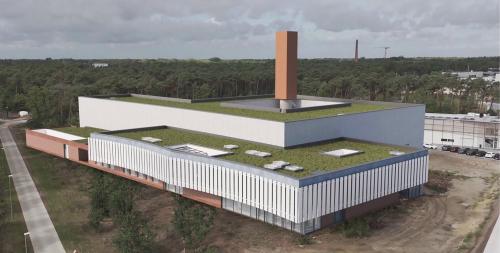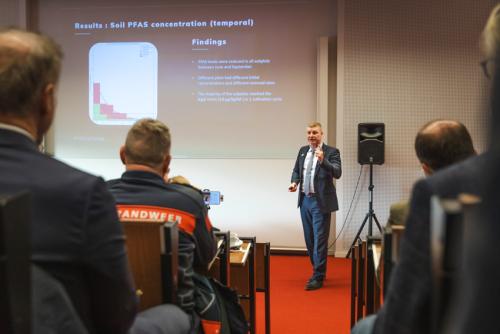Article in Trends: this smart innovation makes the construction sector future-proof
Insulating with mushrooms, water-powered batteries, cleaning polluted soil with microwave technology… Construction company Cordeel is decisively and rapidly pursuing the most sustainable, smartest innovative techniques. This resonates with ING, as the bank is also eager to support companies that aim to make buildings future-proof.
The realization, management, maintenance, and end-of-life approach of buildings are a key part of the environmental impact of companies. "And since every company, whether large or small, will have to report on their sustainability efforts, we at Cordeel Group focus on sustainability," says Laurence Gacoin, CEO of C-Energy and C-Innovation. "For example, we help retrofit existing buildings by looking at energy consumption, gas use, and the lifespan of various installations. We explore how we can assist companies in transitioning to renewable energy sources or electrification instead of gas." ING plays a part in realizing this ambition, points out Marc Callier, Head of Sustainability at ING Business Banking, by offering lower interest rates for those going the extra mile.
With around 1,800 employees, offices in 6 countries, and an annual turnover of 940 million euros, Cordeel Group is one of the largest construction companies in Belgium. The future vision of this independent family business is centered on innovation, sustainability, and acceleration. This strategy ensures that clients can quickly adapt to changes in regulations and market demands, without delays in their own sustainability goals. This has been even more the case since Filip Cordeel, CEO of Cordeel Group, recalibrated the family business’s direction five years ago with the question: which path should we take to remain successful in a constantly changing world?
The answer lies largely in the activities that Laurence Gacoin, CEO of C-Energy and C-Innovation, is responsible for: "The future of Cordeel is clear: a company that not only builds physical projects but also builds a future where sustainability and speed go hand in hand. By focusing on energy transition on one hand, and circularity and sustainability on the other, we are making Cordeel future-proof – something that benefits both the next generation and today’s customers. For many years, we have been developing innovations in materials and technologies. Now that they are market-ready or already on the market, it’s time to tell our story."

The answer lies largely in the activities for which Laurence Gacoin, CEO of C-Energy and C-Innovation, is responsible: "The future of Cordeel is clear: a company that not only builds physical projects but also builds a future where sustainability and speed go hand in hand. By focusing on energy transition on one hand, and circularity and sustainability on the other, we are making Cordeel future-proof – something that benefits both the next generation and today’s customers. For many years, we have been developing innovations in materials and technologies. Now that they are market-ready or already on the market, it’s time to tell our story."
From mushroom to insulation
Cordeel began innovating within its own company, with initiatives that complement the construction sector or can be vertically integrated. Gacoin: “The ongoing question within the company remains: how can we build faster, smarter, and more sustainably? It is essential to offer customers a comprehensive solution, where they have a single point of contact. These solutions range from ‘green concrete’ and sustainable energy to replacing chemical products with local, biological alternatives developed internally.”
A surprising example of the latter is the insulation material that Cordeel grows by cultivating mycelium (the fungal threads, or roots of mushrooms) on hemp and then baking it into compressed prefab panels. This 100% organic insulation performs better at retaining heat and cold, and also excels in fire safety and acoustics. It’s a sustainable alternative to, among other things, PUR foam, which is made from petroleum. The material is now ready to scale up from the high-tech lab to industrial applications.
Other sustainable innovations stamped with the Cordeel brand include construction site batteries as an alternative to often oversized generators, the very first fluorine-, PFAS-, and PFOS-free fire extinguishers with biodegradable liquids, thermal cleaning of contaminated soils with microwave technology instead of processing in incineration plants powered by natural gas, energy hills, or water batteries... “We also look at the broader impact we can have on the sustainability of our customers,” says Gacoin. “For example, if a customer has surplus land, we can suggest planting trees to improve their ecological footprint. Or we propose planting hemp, which can help purify the soil, capture CO2, and provide the raw material for our bio-insulation.”
Feasible and scalable
An important aspect for Cordeel is the scalability of innovation. “We see many projects that are innovative and technically feasible, but need to be quickly matured for practical and large-scale application. To bring those innovations to market quickly, we work closely with research institutions and partners.”
The construction sector is often associated with low margins and high risks. “That’s why it’s important for Cordeel to choose the smartest construction projects, where sustainability and innovation are central,” says Gacoin. “We want to be the most efficient, with the best LCA (Life Cycle Analysis, which maps the environmental impact of a building from raw materials through to construction, use, and waste processing).”
“By offering subscription models such as energy as a service or heat as a service, we ensure that the investment is spread out. Moreover, this total solution provides the certainty that we will ensure the proper functioning of installations (such as heat production, batteries, solar panels, charging stations…) for an agreed period. The result: relieving the customer, ensuring energy cost certainty, fewer unexpected risks, and lower capital expenditures (capex) for the customer.”

Bank as a driving force for innovation
Gacoin highlights the role of banks in general, and ING in particular, in raising awareness among businesses about the importance of sustainability efforts. “They act as an intermediary for us, showing their clients what solutions are available. The collaboration with ING has made it possible, among other things, to finance a large number of construction site batteries, which will replace diesel generators in the future. In this way, they are the driving force that gives our renewed approach and technological innovations enough momentum. Of course, they also benefit from this, because banks can only improve their own sustainability reports by supporting the companies in their portfolio in their journey towards greater sustainability. This requires not only banking expertise but also a deep knowledge of the market and the intrinsic value of innovations.”
Turning a challenge into an opportunity
“The strategy of Cordeel is a great example of how a company can turn a challenge into an opportunity,” says Marc Callier, Head of Sustainability at ING Business Banking. “They see new opportunities in the challenges that the transition brings to the real estate sector and provide innovative solutions.”
ING supports companies in making their buildings futureproof. “In the service sector, the share of emissions from office buildings is significant in a company’s footprint,” Marc Callier continues. “This is especially true for property companies where leasing is the main activity. We raise awareness during client discussions and events. Additionally, we offer entrepreneurs a better understanding of the impact of investments on emissions and energy consumption of their buildings through our Sustainable Buildings Guide.”
Real estate players with large portfolios or complex needs are connected with consulting firms Bopro and Stadim. They conduct a thorough audit of the portfolio and work with the client to develop a transition plan that ensures the buildings remain aligned with future market expectations and maintain their value. “For clients who commit to going a step further than the current regulations during renovations, we offer additional support by financing 100% of energy investments at an attractive interest rate,” concludes Marc Callier.









